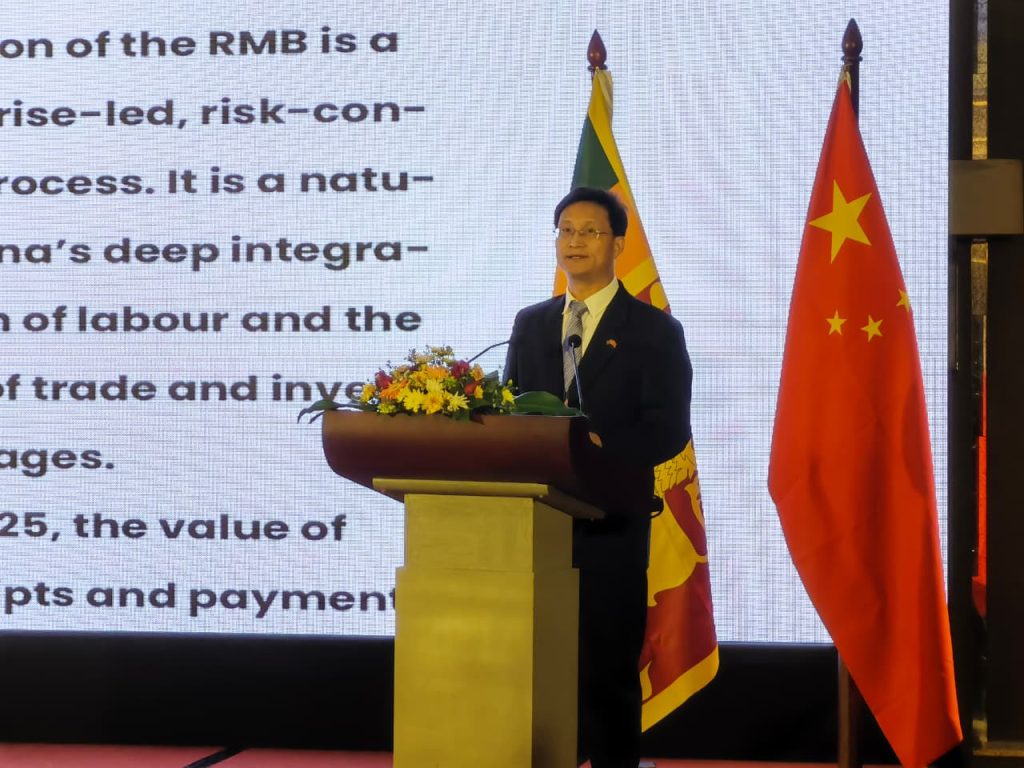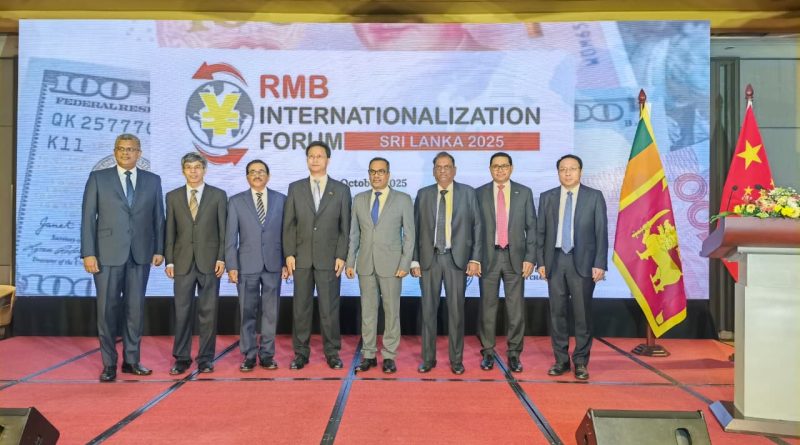Chinese Ambassador Highlights RMB’s Growing Global Role at Colombo Forum
Chinese Ambassador to Sri Lanka, H.E. Qi Zhenhong, delivered a keynote address at the RMB Internationalization Forum 2025 in Colombo, underscoring China’s commitment to promoting the use of its currency — the Renminbi (RMB) — in global trade, investment, and financial markets.
Addressing senior Sri Lankan officials, including Central Bank Governor Dr. Nandalal Weerasinghe, Minister of Labour and Deputy Minister of Finance Dr. Anil Jayantha Fernando, and Finance Secretary Dr. Harshana Suriyapperuma, Ambassador Qi said the internationalization of the RMB is a “market-driven, enterprise-led, risk-controllable, and gradual process” aimed at creating a more stable and inclusive global financial system.
He emphasized that broader use of the RMB could help developing nations like Sri Lanka diversify foreign exchange reserves, reduce exchange-rate risks, and lower settlement costs in trade and investment. The Ambassador highlighted China’s growing financial connectivity, noting that RMB clearing banks have been established in 33 countries, with its inclusion in the IMF’s Special Drawing Rights basket marking a major milestone.
Ambassador Qi concluded by calling for greater multilateral cooperation, saying that China stands ready to work with all partners to promote a “diversified, balanced, and resilient international monetary system.”
Keynote Speech by H.E. Qi Zhenhong, Chinese Ambassador to Sri Lanka, at the RMB Internationalization Forum 2025 – Colombo
His Excellency Dr. P. Nandalal Weerasinghe, Governor of the Central Bank of Sri Lanka; Hon. Dr. Anil Jayantha Fernando, Minister of Labour and Deputy Minister of Finance and Planning; Dr. Harshana Suriyapperuma, Secretary to the Ministry of Finance; Dr. Chen Weidong; Distinguished Guests; Ladies and Gentlemen — Ayubowan! Vanakkam! Good evening!
It is my great pleasure to join you at this Forum on the Internationalisation of China’s currency, the Renminbi (RMB). First of all, I would like to thank the organisers for providing such an important platform for dialogue.
This year marks the 80th anniversary of the founding of the United Nations. Since its establishment, the international monetary system has evolved from a dollar-centred fixed-exchange-rate regime to a dollar-centred floating-rate system. Whether during the Bretton Woods era or under the system formed by the Jamaica Agreement, the U.S. dollar has consistently served as the world’s main reserve and settlement currency, forming the foundation of the post-war international economic order.
Over time, this system has supported global recovery, facilitated trade, and maintained overall financial stability. However, as globalisation deepens and the economic landscape evolves, the dollar-centric model has revealed structural imbalances — including unequal liquidity distribution, financial risk spill-overs, and the marginalisation of developing economies’ interests.
Former U.S. Treasury Secretary John Connally’s remark in the 1970s — “the dollar is our currency, but it’s your problem” — still echoes today. The dominance of a single currency means that when a major economy changes policy to combat inflation, its effects ripple across the globe. Developing countries often face exchange-rate shocks, higher borrowing costs, and slower growth as a result.
In this context, exploring a fairer, more stable, and inclusive framework for the international monetary system has become a shared global objective. As the world’s second-largest economy and a leading trading nation, China is actively contributing to this reform and steadily advancing the internationalisation of the RMB.
The RMB’s use in cross-border trade, reserves, and investments continues to expand — particularly in energy, finance, and infrastructure sectors. Our goal is to offer a pragmatic complement to the current system: increasing global currency choices, strengthening financial resilience, and creating space for shared development. This embodies multilateralism, openness, and cooperation — reflecting the growing trend toward diversification in global finance.
For developing countries like Sri Lanka, the process is of significant value. Broader use of the RMB can help diversify reserves, reduce exchange-rate risks, and establish more stable, lower-cost settlement mechanisms for trade, investment, and financing — enhancing both currency stability and macroeconomic resilience. As Sri Lanka continues its economic recovery and structural reforms, RMB cooperation can provide fresh impetus for trade facilitation, investment attraction, and financial modernization.
Friends, the internationalisation of the RMB is a market-driven, enterprise-led, risk-controllable, and gradual process — a natural result of China’s deep integration into global trade and investment networks.
In the first half of 2025, cross-border RMB receipts and payments reached 35 trillion yuan, a 14% year-on-year increase. Over 80 countries and regions now include the RMB in their foreign exchange reserves. RMB-denominated assets feature in major global indices, and Hong Kong has become the central hub for offshore RMB business, complemented by thriving markets in London, Singapore, and Dubai. Offshore RMB deposits total about 1.6 trillion yuan, and RMB bonds — including Panda Bonds — exceed 2 trillion yuan.
China’s Cross-border Interbank Payment System (CIPS) now connects 1,729 participants and over 5,000 financial institutions across 189 countries. Meanwhile, the digital yuan (e-CNY) is making steady progress in cross-border use, improving settlement efficiency through payment and QR code interoperability.
RMB clearing banks have been established in 33 financial centres worldwide. The RMB is also part of the IMF’s Special Drawing Rights (SDR) basket with a 12.28% weight — ranking third after the U.S. dollar and euro. The People’s Bank of China has signed 32 bilateral currency swap agreements with central banks, including those of the EU, South Korea, Indonesia, Brazil, and Saudi Arabia, totalling around 4.5 trillion yuan.
These measures simplify procedures, lower costs, and help enterprises manage risks and enhance resilience. China has always taken a prudent and pragmatic approach to RMB internationalisation — seeking to make the global financial system more diversified, stable, and inclusive, with greater participation from developing nations.
Friends, Ladies and Gentlemen —
China stands ready to work with all partners under the principles of extensive consultation, joint contribution, and shared benefits. We will continue to uphold openness, inclusiveness, and win-win cooperation — making the RMB an integral part of the diversified mosaic of the international monetary system and contributing to a more balanced, resilient, and inclusive global financial order.
All of you here are experts with deep experience in the monetary and financial sectors. I believe your insights and perspectives will enrich our dialogue and inspire new ideas. Let us use this forum to gather consensus, exchange wisdom, and translate ideas into practical action.
Together, let us advance the internationalisation of the RMB and regional cooperation, writing a new chapter in global financial development.
Thank you all!


